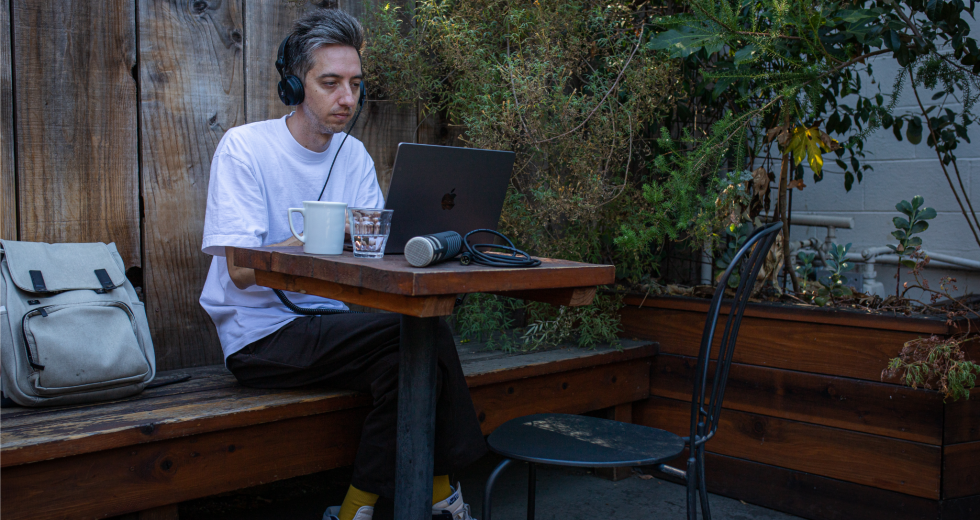Cole Cuchna cringes when he hears a snippet from late season three of his music theory podcast, “Dissect.” It was around 2018 and the success of his second season on Kanye West’s “My Beautiful Dark Twisted Fantasy” had just changed his life. He was doing what he loves — immersing himself in music — for a living. The New York Times and Time magazine added the podcast to their “best of” lists, and with so many new listeners, he felt a self-imposed pressure to “up the energy.” Cuchna tried on a voice he thought would be more engaging than what he describes as his naturally monotone inflection. “In retrospect, it’s embarrassing,” he laughs. Cuchna has since dropped the affectation and now embraces the style that first made his podcast so popular among tens of millions of music nerds.
With his ninth season of “Dissect” wrapped in early 2022, Cuchna has analyzed nine albums by some of the biggest names in hip-hop. He’s also produced a handful of miniseries with the same annotative flair. (One includes a conversation with comedian Hasan Minhaj, a Davis native.) The podcast producer, who is based in Sacramento, credits the genesis of the concept with his bridging of two experiences — first as a self-taught contemporary musician (he was in an indie rock band as a young adult), then as a student analyzing classical music at Sacramento State’s music theory and composition program (he started the bachelor’s program at 27). Cuchna thought, “What if I take those analysis skills, apply them to contemporary music, and write papers essentially, like I used to do in college, which I really love to do? That was the basic premise.”
Cuchna saw the podcast’s potential right away when he created it independently in 2016. There were people who, like him, were passionate about art and “needed a central town square, for lack of a better metaphor, to gather around, in the same way subreddit pages are places where people go to geek out.” Spotify saw the potential as well. Just before season three’s focus on Frank Ocean’s “Blonde,” Cuchna signed with the music streaming giant. The partnership meant he became a full-time employee with a budget for more resources; Cuchna now works with a co-writer and audio editor. Since the transition, the show has retained its heavily researched, rabbit-hole quality, and the host still writes all the scripts. He’s also found success on social media, with one video going viral at 30 million views across platforms — and shared by Lebron James.
The “Dissect” tagline, “great art deserves more than a swipe,” is
based on Cuchna’s philosophy that “there’s value to spending a
lot of time with one thing, rather than a few seconds or 100,000
things a day.”
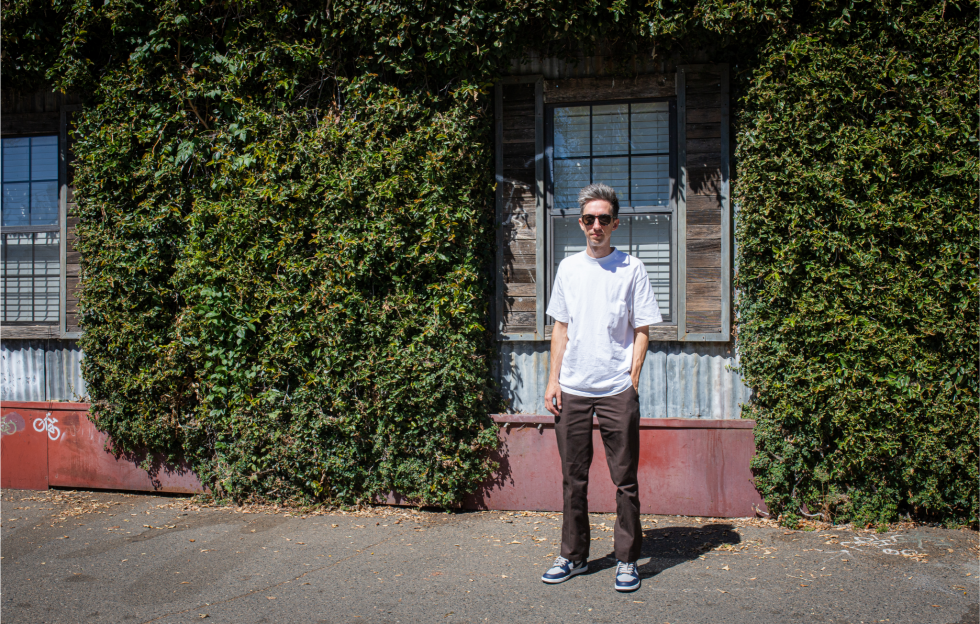
Cuchna’s listeners are invested with a fervor that commits them to his dense spoken dissertations on songs like “DNA” by Kendrick Lamar. “I hope it doesn’t come through on the podcast that this is definitive, this is the answer. It’s not, it’s just my interpretation of it.” (Although he admits some of the artists’ teams have reached out to praise his analyses.) Cuchna gives listeners the vocabulary — “interpolation” and “sonic collages” are part of the “Dissect” lexicon — to interrogate their favorite albums and enjoy a deeper connection with the music they love.
In April, Cuchna applied that connection to a talk he delivered at TEDxBerkeley called “The Power of Listening.” Although he says his nerves gave him “a silent existential crisis” backstage, he’s glad he did it and excited the talk might be shared by the main TED Talk. But mostly, he is happy being “hidden behind the podcast” and recording in his closet.
How I approach research and develop my point of view:
It helps that I usually pick albums that have a very deliberate story. So that allows me some leeway in terms of, is this person playing a character here, because this is a story. Kendrick is a great example. Because he’ll literally rap from the perspective of Uncle Sam, and he’ll say it in the verse. So it’s like, oh, that’s what he’s doing. But sometimes it’s more subtle than that. And that’s where I think context is the biggest indicator.
Really considering context, doing the research, like reading and listening to everything the artist has said about the record. Usually you get little clues to what they’re doing through the interviews and stuff. Research and context allow me to be more strong in, this is what this person is doing. But if you actually listen to “Dissect” closely, I frame everything like “it seems like they’re doing this” or very intentionally saying like this is just a possibility, based on all these patterns that I’m seeing.
Cuchna believes art and music improve our lives by allowing us to
learn from the experience of others.
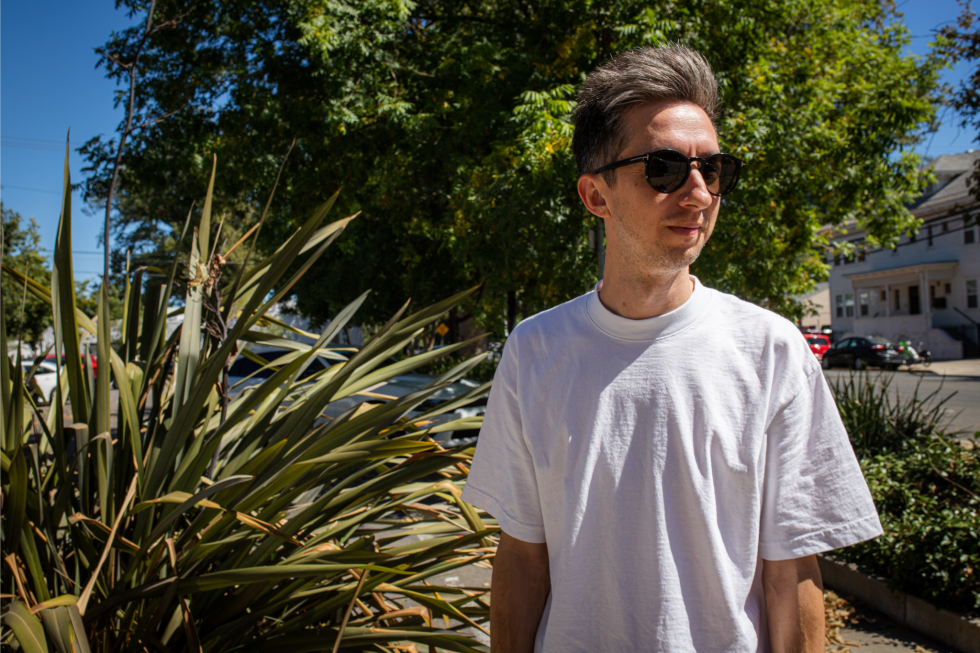
On the decision to switch from independent producer to a full-time employee of Spotify:
Well, money was a big one (laughs). Because at that point, season two was when I started to get a lot of offers from podcast companies. Like, hey, bring the show here, we’ll help you get advertisers. That was the standard model back then — just ad revenue. Plus I was doing Patreon for a while. Patreon was actually, even in the second season, getting to a point where I was like, oh, if this keeps growing the way it is, I can definitely get to a point where the Patreon would have just sustained me.
But Spotify was attractive. I would say having kids was probably the most crucial element. If I was younger, I probably would have stayed independent. I just had way more flexibility back then. But, you know, providing for a family is kind of a big deal. And so when Spotify offers you a full-time position that’s consistent income, that’s very attractive. It has benefits, so practically it was the best offer.
On being an early addition to Spotify’s new podcasting approach:
I was (among) the first acquired podcasts that Spotify took on. And they’ve now since acquired a lot of — Joe Rogan’s the biggest one, obviously — but they’ve since acquired a lot of podcasts. So I came in when Spotify only had 10,000 podcasts on the platform. Now there’s like 6 million. So it was the very ground-level stages. And the guy that brought me on, Courtney Holt, essentially laid out his vision for revolutionizing podcasting on Spotify.
He was like, we’re going to change the ad formats, all this stuff, and I believed him. And it’s all come to fruition within a couple years, which has been pretty crazy to see their commitment to podcasting, what they’ve done for the industry. The big thing he told me was: I’m not going to tell you how to do your show, I’m not going to tell you what albums to pick. We’re just going to give you more resources. And that’s been true, they’ve never influenced me on really anything, they’ve only provided resources and marketing and promotion. So I’ve been with him almost five years now and really have no complaints.
Cuchna describes “Dissect” as ” very nerdy and for a very
specific type of person.”
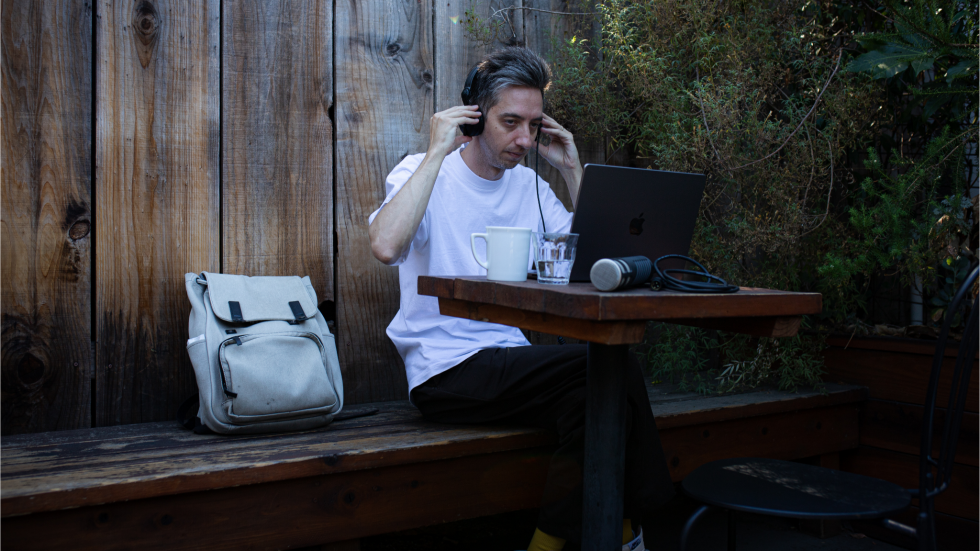
Branching out to the comedy and visual genres:
(Covering comedian/musician Bo Burnam’s Netflix special “Inside”) was definitely a departure. I personally loved it, because to me, the genre doesn’t matter. I fall in love mostly with the ideas and the meaning and the messages in it. So if it’s in a comedy album, cool. But it was fun to do the visual, because I’m always wondering if you could do a “Dissect” for film and have it be a podcast. The big question mark there is, can you do something that is audio only without the visuals, right? It’d make more sense, you’d think, in a YouTube format or something. So that was kind of an experiment to see if I could do that. I just wanted to do something different.
Looking ahead to other longform mediums:
I think whenever “Dissect” burns to the ground (laughs), I’ll probably end up writing books. I definitely want to write a book eventually, but I don’t have the time. I actually was offered a book deal and I turned it down because I was like, I’m already writing 6,000 words an episode. I’m not about to write two books simultaneously, essentially. So I think I’ll get to it one day. And video format is interesting to me. But again, I only have so much time, and I have two kids. So my life is, like, maxed out already right now.
On the intersection of imposter syndrome and motivation:
I definitely have impostor syndrome, where I’m thinking this is going to end one day, I’m going to get fired. People will just stop listening. So I feel that fear. I just don’t want to allow myself to coast because that’s when you get stagnant. That’s when you don’t do your best work. So I think maybe I’m building motivation. Five years in now with Spotify, I’m like, is this real? I definitely don’t take it for granted.
Edited for length and clarity.
–
Stay up to date on art and culture in the Capital Region: Subscribe to the Comstock’s newsletter today.
Recommended For You
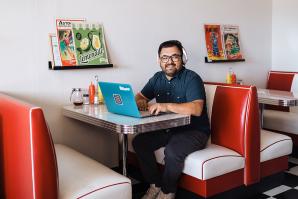
Getting to Know: Johnny Flores
As business heats up, the podcaster is winding down ‘Serious Talk. Seriously.’
After 25 years of working 9-5 jobs, Johnny Flores has gone all in on his podcast business, Flores Podcast Consulting, and as a result says he is “happier and more peaceful” than ever.
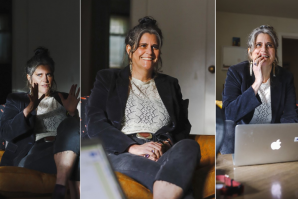
Getting to Know: Sarah Miller
A New Yorker satire writer and journalist calls Nevada City home
Freelance essayist Sarah Miller lends her idiosyncratic
style to The New Yorker website and many other
publications. The Nevada City-based writer was
commissioned by Substack to start her own
newsletter earlier this year.
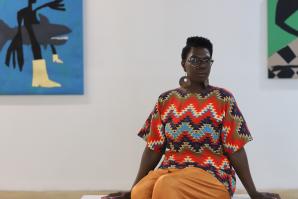
Getting to Know: Faith J. McKinnie
Gallerist Faith J. McKinnie is highlighting the work she wants to
see in her Midtown gallery that highlights contemporary art
by underrepresented artists.



